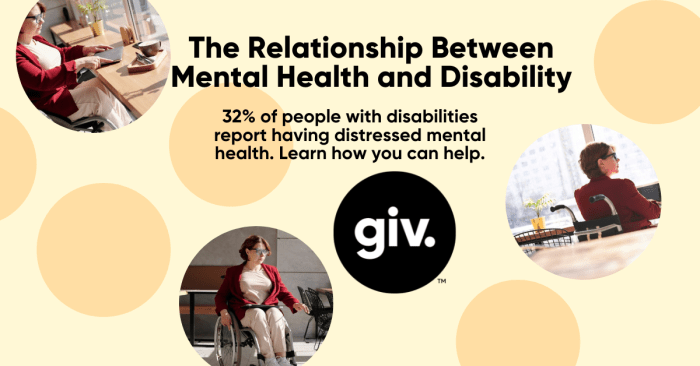
Mental health and disability benefits are crucial topics that impact the lives of many individuals facing psychological challenges. Understanding the intricacies of how mental health conditions relate to eligibility for disability benefits can be life-changing for those in need of support.
By exploring the criteria for qualification, the application process, and the subsequent impact on quality of life, we can shed light on the vital role these benefits play. From coping strategies to the significance of insurance options, this discussion aims to empower those navigating the complexities of mental health and disability support.
Understanding Mental Health and Disability Benefits
Navigating the intersection of mental health and disability benefits can be complex yet crucial for individuals facing mental health challenges. Recognizing how mental health conditions may impact eligibility for disability benefits is essential for those seeking assistance. This understanding can empower individuals to pursue the support they need while navigating the application process effectively.Mental health conditions, such as depression, anxiety disorders, bipolar disorder, and schizophrenia, can significantly impair an individual’s ability to work and perform daily activities.
In many jurisdictions, these conditions may qualify an individual for disability benefits if they meet specific criteria established by health and social services agencies. Understanding these criteria is vital to determining eligibility for support.
Criteria for Mental Health-Related Disabilities
The criteria for qualifying mental health disabilities typically encompass several aspects that assess the severity and impact of the condition on daily functioning. These criteria may include:
- Diagnosis: A formal diagnosis from a qualified mental health professional is necessary to establish the presence of a recognized mental health condition.
- Functional Limitations: The applicant must demonstrate how their mental health condition limits their ability to perform essential activities required for work and daily living.
- Duration of Condition: The condition must be expected to last for a specific duration, often at least 12 months, to be considered chronic and qualifying for benefits.
- Treatment History: Documentation of ongoing treatment and compliance with prescribed therapies is often required to assess the seriousness of the condition.
Establishing these elements can help create a compelling case for eligibility, emphasizing the individual’s impairment and need for support.
Application Process for Disability Benefits
The application process for claiming disability benefits due to mental health issues involves several key steps that require careful attention and thorough documentation. The initial step involves gathering all necessary documentation, including medical records, diagnosis letters, and treatment histories, to substantiate the claim. These documents play a critical role in establishing the severity of the mental health condition.Next, individuals typically complete a detailed application form, which may vary by jurisdiction but generally requires personal information, work history, and specific details regarding the mental health condition.
Once submitted, the application undergoes a review process. During this time, it’s crucial for applicants to respond promptly to any requests for additional information from the reviewing agency. Keeping all communication organized and documented can facilitate this process.In some cases, applicants may be required to attend an evaluation with a medical professional appointed by the agency. This evaluation serves to assess the individual’s condition further and verify the information provided.Maintaining awareness of potential delays and follow-up procedures is essential throughout the application process, as waiting times can vary significantly based on location and the nature of the claim.
By understanding these steps and preparing accordingly, individuals can enhance their chances of successfully obtaining the benefits they rightfully deserve.
Exploring the Impact of Mental Health on Quality of Life

Mental health plays a pivotal role in determining an individual’s overall quality of life. Challenges related to mental health can significantly affect daily living activities, personal relationships, and employment opportunities. Understanding these impacts is essential for both individuals seeking disability benefits and the wider community that supports them.Mental health challenges can manifest in various ways, leading to difficulties in managing routine tasks and maintaining a steady job.
Conditions such as anxiety, depression, or bipolar disorder can hinder concentration, diminish motivation, and create barriers to effective communication. For example, an individual experiencing severe anxiety may find it challenging to attend work meetings or engage with colleagues, affecting both their productivity and workplace relationships. Data shows that individuals with mental health disabilities are less likely to be employed compared to those without, highlighting a considerable disparity in workforce participation.
Role of Support Systems and Therapy
Support systems and therapy are vital components in enhancing the quality of life for individuals with mental health disabilities. They provide emotional backing, practical assistance, and therapeutic interventions that contribute to recovery and daily functioning. The presence of a strong support network, including family, friends, and community organizations, can significantly mitigate feelings of isolation and despair.Therapeutic approaches, such as cognitive behavioral therapy (CBT), can equip individuals with coping strategies to manage their symptoms effectively.
For instance, a person receiving therapy might learn techniques to challenge negative thought patterns, improving their self-esteem and ability to face everyday challenges. Furthermore, support groups offer a platform for sharing experiences and strategies, fostering a sense of belonging and mutual understanding among participants.
The combination of therapy and a solid support system can lead to improved mental health outcomes and a higher quality of life.
Successful coping strategies also contribute to the well-being of those receiving disability benefits. These strategies can include mindfulness practices, regular physical activity, and creative outlets such as art or music. Engaging in hobbies not only serves as a distraction from mental health struggles but can also foster a sense of achievement and joy.Moreover, establishing a daily routine can provide individuals with structure and predictability, which is especially beneficial for those dealing with mental health conditions.
For example, scheduling time for exercise, hobbies, and social interactions can create a balanced lifestyle that promotes emotional stability and resilience.In essence, the interplay of effective support systems, therapeutic interventions, and personal coping strategies plays a crucial role in shaping the quality of life for individuals with mental health challenges. Through these combined efforts, individuals can navigate their disabilities more successfully and work towards fulfilling lives.
Navigating Insurance Options for Mental Health and Related Needs
Understanding the insurance landscape for mental health and related support services is crucial for individuals seeking comprehensive care. With various options available, it’s important to identify which plans best meet the needs of those experiencing mental health challenges and disabilities. This section explores the nuances of insurance coverage, particularly how it pertains to mental health treatment, dental insurance options, and the considerations for individuals living in high-risk areas.
Comparison of Dental Insurance Coverage Options Including Mental Health Support Services
Dental insurance can sometimes extend to include mental health support services, though this integration varies significantly across plans. While traditional dental coverage primarily focuses on oral health, some progressive plans recognize the connection between oral health and mental well-being. The following points highlight important factors to consider when evaluating these options:
- Integration of Services: Some dental plans may offer benefits that address mental health issues, particularly for individuals whose dental health is adversely affected by mental health conditions such as anxiety or depression.
- Preventive Care: Dental plans that include mental health support often emphasize preventive care, which can lead to better overall health outcomes.
- Access to Therapists: A few innovative plans may provide access to therapists specializing in the psychological aspects of dental health.
Differences Between Health Insurance Plans Accommodating Mental Health Treatment and Disability Coverage
Health insurance plans specifically designed to accommodate mental health treatment differ from those that provide disability coverage. Understanding these distinctions can help individuals make informed choices regarding their health care. Key differences include:
- Scope of Coverage: Health insurance plans typically offer a range of mental health treatments such as therapy, counseling, and medication management, while disability coverage focuses on income replacement and financial support when an individual is unable to work due to a mental health condition.
- Eligibility Criteria: Access to mental health treatment through health insurance often involves criteria related to medical necessity, while disability coverage typically requires evidence of a long-term impairment.
- Duration of Benefits: Health insurance may provide ongoing support for as long as treatment is deemed necessary, whereas disability benefits may have time limits and are contingent upon periodic evaluations of the individual’s condition.
Relevance of Flood Insurance for Individuals with Mental Health Disabilities in High-Risk Areas
For individuals with mental health disabilities residing in high-risk flood areas, having flood insurance can be a critical component of their overall stability. The implications of natural disasters on mental health are profound, making it essential to consider the following aspects:
- Emotional Impact: Flooding can exacerbate mental health issues, creating additional stress and anxiety. Flood insurance can provide financial relief, allowing individuals to focus on recovery.
- Housing Security: Having flood insurance helps ensure that individuals can maintain their homes, which is particularly important for those with mental health disabilities who may struggle with instability.
- Supporting Recovery: Coverage can facilitate timely recovery efforts, helping individuals access necessary resources and support services post-disaster.
Closing Summary

In summary, mental health and disability benefits are essential components of support for individuals striving to improve their quality of life amidst challenges. Understanding the criteria, application processes, and available resources can pave the way for better mental health outcomes and a more stable future for those in need.
FAQs
What mental health conditions qualify for disability benefits?
Conditions such as depression, anxiety disorders, bipolar disorder, and schizophrenia may qualify, depending on severity and impact on daily life.
How long does it take to process a disability claim for mental health?
The processing time can vary, but it typically takes between three to six months, depending on the complexity of the case and the workload of the disability office.
Can I work while receiving disability benefits for mental health?
Yes, some programs allow for limited work while receiving benefits, but earnings must remain below a certain threshold to avoid losing benefits.
What kind of support can I expect while on disability for mental health?
Individuals can access therapy, counseling services, and community support programs aimed at improving mental health and daily functioning.
Is there a way to appeal a denied disability claim for mental health issues?
Yes, individuals have the right to appeal a denied claim by following specific procedures Artikeld by the disability office, often involving additional documentation and reviews.





